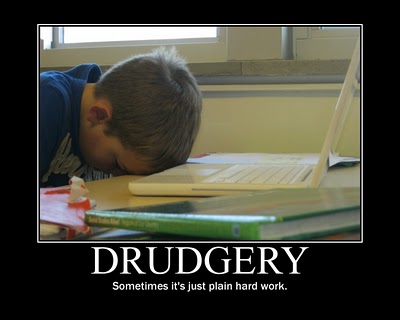 A few days ago I found myself wondering, as I sometimes do, just what the hell I was doing with my life. It was one of those unseasonably warm, sunny, beautiful days that we’ve been enjoying recently, and I, of course, was stuck in lab like the champion that I am. While seemingly everyone else was out enjoying a glorious weekend afternoon, I was slogging through some interminable, odious task, one that had no real intellectual depth or interest, or even connection to the research that I personally am pursuing. In short, I was doing somebody else’s scut work.
A few days ago I found myself wondering, as I sometimes do, just what the hell I was doing with my life. It was one of those unseasonably warm, sunny, beautiful days that we’ve been enjoying recently, and I, of course, was stuck in lab like the champion that I am. While seemingly everyone else was out enjoying a glorious weekend afternoon, I was slogging through some interminable, odious task, one that had no real intellectual depth or interest, or even connection to the research that I personally am pursuing. In short, I was doing somebody else’s scut work.
As the sounds of merriment and a sweet afternoon breeze wafted through my office window, I paused for a moment to feel sorry for myself, and to ruminate over the disastrous sequence of terrible, terrible life choices that had led me to my current predicament. I must have done something utterly heinous in a past life to deserve this, I thought to myself. Perhaps I voted Republican.
I am sure that I am not alone in this experience; indeed, I am often struck by how much of our time as graduate students is devoted to mindless, tedious, and incredibly irritating tasks that could probably be done just as well by small children, the way that God and Adam Smith intended. This is doubly true for those among us who work in experimental disciplines (you poor bastards). So why do we do it? Why should we continue to do it, if the doing is so often unpleasant?
A few months ago, a friend forwarded me a brief excerpt that addresses this very question. As is the case with all great writing and literature, it crystallizes into words something about the human experience that we may vaguely intuit, but whose clear articulation eludes us. For your consideration, let me submit this short passage on the gains of drudgery, whose third paragraph seems particularly apropos:
By drudgery, I mean work that in itself is not pleasant, that has no immediate effect in stimulating our best powers, and that only remotely serves the purpose of our general advancement. Such a definition may not be perfect, but it expresses with reasonable accuracy what we usually understand by the term.
 Now, if this is what we mean by drudgery, it is clear that we are all drudges. We all have to do many things, day by day, which we would rather not do. Even in the callings that seem to present the most perfect correspondence between gifts and work, such as those of the writer or the artist, drudgery dogs the heels of all progress…We show some perception of these facts in our common sayings, that easy writing makes hard reading, and what costs a man little is usually worth little. But few of us have any adequate sense of the immense toil which lies behind the brilliant successes of the great artist or famous writer. And the same thing might be said of the lives of great statesmen, politicians, reformers, merchants, and memorable men in all walks of life. Examine such lives, and the amount of prolonged toil which lies behind all the glitter of public fame is enormous, and to the indolent even appalling. If any man of the Elizabethan period gives the impression of having achieved great things with a certain airy ease and instinctive facility of touch, it is Walter Raleigh. Yet it was of Raleigh that Elizabeth said, ‘he could toil terribly.’ The same thing may be said of every great man, so that it is small wonder that we have learned to believe that genius itself is simply an infinite capacity for taking pains…
Now, if this is what we mean by drudgery, it is clear that we are all drudges. We all have to do many things, day by day, which we would rather not do. Even in the callings that seem to present the most perfect correspondence between gifts and work, such as those of the writer or the artist, drudgery dogs the heels of all progress…We show some perception of these facts in our common sayings, that easy writing makes hard reading, and what costs a man little is usually worth little. But few of us have any adequate sense of the immense toil which lies behind the brilliant successes of the great artist or famous writer. And the same thing might be said of the lives of great statesmen, politicians, reformers, merchants, and memorable men in all walks of life. Examine such lives, and the amount of prolonged toil which lies behind all the glitter of public fame is enormous, and to the indolent even appalling. If any man of the Elizabethan period gives the impression of having achieved great things with a certain airy ease and instinctive facility of touch, it is Walter Raleigh. Yet it was of Raleigh that Elizabeth said, ‘he could toil terribly.’ The same thing may be said of every great man, so that it is small wonder that we have learned to believe that genius itself is simply an infinite capacity for taking pains…
But the gains of drudgery are not seen only in the solid successes of life, but in their effect upon the man himself. Let me take in illustration a not infrequent case. Suppose a man gives up his youth to the struggle for some coveted degree, some honour or award of the scholarly life. It is very possible that when he obtains that for which he has struggled, he may find that the joy of possession is not so great as the joy of the strife. It is part of the discipline of life that we should be educated by disillusion; we press onward to some shining summit, only to find that it is but a bastion thrown out by a greater mountain, which we did not see, and that the real summit lies far beyond us still. But are we the worse for the struggle? No; we are manifestly the better, for by whatever illusion we have been led onward, it is at least clear that without the illusion we should not have stood as high as we do. So a man may either fail or succeed in gaining the prize which he covets; but he cannot help being the gainer in himself. He has not attained, but he has fitted himself for attaining. It is better to fail in achieving a great thing than to succeed in achieving a little one, and the struggle that fails is, in any case, to be preferred to the stolidity which never aspires. And why? Because the struggle is sure to develop certain great and noble qualities in ourselves. Thus, though such a man may not gain the prize he sought, he has gained a command over his chance desires, a discipline of thought, a power of patient application, a steadiness of will and purpose, which will stand him in good stead throughout whatever toils his life may know in the hidden years which lie before it. And even if he gain the prize he sought, the real prize is found not in a degree, a certificate, a brief taste of applause on a commemoration day, but in the deeper strength of soul, the wider range of wisdom, which the long discipline of unflagging effort has taught him. So true is this, that Lessing, who was among the wisest of thinkers, said, that if he had to choose between the attainment of truth and the search for truth, he would prefer the latter. The true gain is always in the struggle, not the prize. What we become must always rank as a far higher question than what we get.
So as we enter the “midterm slump”, when the vitalizing reprieve afforded by IAP is fading from memory, and the long-awaited end of the academic term is not yet in sight, take heart, dear reader: we are fitting ourselves for attainment. Indeed, by the time we graduate we’ll have done so much fitting that attainment will be virtually inescapable. Oh, the places we’ll go!
And on that happy note, back to the salt mines!
By Nemo
| Note: SPeaker’s Opinion is an anonymous contribution from a SP resident. To submit comments, suggestions for future article topics, etc., please write to Nemo at letters.to.nemo@gmail.com. |
